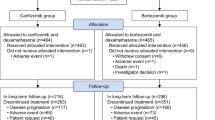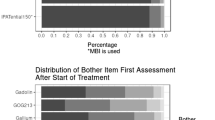Abstract
Purpose
In brain tumours, brain metastases or advanced cancer; treatment with corticosteroids, side effects can add to symptoms. These are best assessed by patients, complementing clinical assessment. We assessed the feasibility and validity of the Dexamethasone Symptom Questionnaire–Chronic (DSQ-Chronic), patient and caregiver versions.
Methods
A longitudinal cohort study was conducted, collecting clinician-rated toxicity, performance status, dexamethasone dose and DSQ-Chronic (patient and caregiver versions) at baseline, then 2, 4 and 8 weeks later. Patients had a primary malignant brain tumour, brain metastases, or advanced cancer; Karnofsky Performance Status ≥40 and predicted survival ≥8 weeks. Analysis included questionnaire completion rates, frequency and severity of dexamethasone-attributable side effects, agreement between patient and caregiver ratings, comparison with clinician-rated toxicity and correlation with performance status.
Results
Sixty-six patients were recruited (mean age 60 years), with their caregivers. Completion of questionnaires was over 90 % for the dyad at baseline but dropped over time, with caregiver completion rates higher at all timepoints. Agreement between patients and proxies was fair to moderate, and while proxies systematically overestimated symptom severity on DSQ-chronic total scores, the bias was less than 10 points. Patient and clinician agreement was higher for more objective symptoms.
Conclusion
The DSQ-Chronic is feasible when the patient is relatively well. As capacity to complete the DSQ-Chronic diminishes, caregivers can be proxy-raters. Clinicians capture corticosteroid toxicities, which may not be obvious to the patient. The DSQ-Chronic, patient and caregiver versions, are useful tools to be used with clinician assessment.


Similar content being viewed by others
References
Sarin R, Murthy V (2003) Medical decompressive therapy for primary and metastatic intracranial tumours. Lancet Neurol 2(6):357–365
Kaal ECA, Vecht CJ (2004) The management of brain edema in brain tumors. Curr Opin Oncol 16(6):593–600
Paulsen O, Klepstad P, Rosland JH, Aass N, Albert E, Fayers P, et al. (2014) Efficacy of methylprednisolone on pain, fatigue, and appetite loss in patients with advanced cancer using opioids: a randomized, placebo-controlled, double-blind trial. J Clin Oncol
Yennurajalingam S, Frisbee-Hume S, Palmer JL, Delgado-Guay MO, Bull J, Phan AT et al (2013) Reduction of cancer-related fatigue with dexamethasone: a double-blind, randomized, placebo-controlled trial in patients with advanced cancer. J Clin Oncol 31(25):3076–3082
Franco M, William L, Poon P, Azad A (2014) Dexamethasone for cancer-related fatigue. J Clin Oncol 32(6):608–609
Leppert W, Buss T (2012) The role of corticosteroids in the treatment of pain in cancer patients. Curr Pain Headache Rep 16(4):307–313
Miller S, McNutt L, McCann MA, McCorry N (2014) Use of corticosteroids for anorexia in palliative medicine: a systematic review. J Palliat Med 17(4):482–485
Paulsen O, Aass N, Kaasa S, Dale O (2013) Do corticosteroids provide analgesic effects in cancer patients? A systematic literature review. J Pain Symptom Manag 46(1):96–105
Sturdza A, Millar BA, Bana N, Laperriere N, Pond G, Wong RK et al (2008) The use and toxicity of steroids in the management of patients with brain metastases. Supportive Care in Cancer : Off J Multinational Assoc Supportive Care in Cancer 16(9):1041–1048
Hardy JR, Rees E, Ling J, Burman R, Feuer D, Broadley K et al (2001) A prospective survey of the use of dexamethasone on a palliative care unit. Palliat Med 15(1):3–8
Ryan R, Booth S, Price S (2012) Corticosteroid-use in primary and secondary brain tumour patients: a review. J Neurooncol 106(3):449–459
Heimdal K, Hirschberg H, Slettebo H, Watne K, Nome O (1992) High incidence of serious side effects of high-dose dexamethasone treatment in patients with epidural spinal cord compression. J Neurooncol 12(2):141–144
Vecht CJ, Hovestadt A, Verbiest HB, van Vliet JJ, van Putten WL (1994) Dose-effect relationship of dexamethasone on Karnofsky performance in metastatic brain tumors: a randomized study of doses of 4, 8, and 16 mg per day. Neurology 44(4):675–680
Gotay C (2009) Patient symptoms and clinician toxicity ratings: both have a role in cancer care. J Natl Cancer Inst 101(23):1602–1603
Sizoo EM, Dirven L, Reijneveld JC, Postma TJ, Heimans JJ, Deliens L et al (2014) Measuring health-related quality of life in high-grade glioma patients at the end of life using a proxy-reported retrospective questionnaire. J Neurooncol 116(2):283–290
Sneeuw KC, Sprangers MA, Aaronson NK (2002) The role of health care providers and significant others in evaluating the quality of life of patients with chronic disease. J Clin Epidemiol 55(11):1130–1143
Vardy J, Chiew KS, Galica J, Pond GR, Tannock IF (2006) Side effects associated with the use of dexamethasone for prophylaxis of delayed emesis after moderately emetogenic chemotherapy. Br J Cancer 94(7):1011–1015
National Cancer Institute. Common Terminology Criteria for Adverse Events (CTCAE) v4.0 (2010) Common Terminology Criteria for Adverse Events (CTCAE) and Common Toxicity Criteria (CTC). US National Institutes of Health
Jones JM, McPherson CJ, Zimmermann C, Rodin G, Le LW, Cohen SR (2011) Assessing agreement between terminally ill cancer patients’ reports of their quality of life and family caregiver and palliative care physician proxy ratings. J Pain Symptom Manag 42(3):354–365
Schag C, Heinrich R, Ganz P (1984) Karnofsky performance status revisited: Reliability, validity, and guidelines. J Clin Oncol 2:187–193
Karnofsky D, Burchenal J (1949) The clinical evaluation of chemotherapeutic agents in cancer. In: MacLeod C (ed) Evaluation of chemotherapeutic agents. Columbia Univ Press, Columbia, p 196
Blazeby J, Sprangers M, Cull A, Groenvold M, Bottomley A (2002) Guidelines for developing questionnaire modules. 3rd edition revised ed. EORTC quality of life group, Brussels
Landis JR, Koch GG (1977) The measurement of observer agreement for categorical data. Biometrics 33(1):159–174
Feinstein AR. An additional basic science for clinical medicine: IV. The development of clinimetrics. (0003-4819 (Print))
Bland JM, Altman DG (1986) Statistical methods for assessing agreement between two methods of clinical measurement. Lancet 1(8476):307–310
Osoba D, Rodrigues G, Myles J, Zee B, Pater J (1998) Interpreting the significance of changes in health-related quality-of-life scores. J Clin Oncol 16(1):139–144
Revicki D, Hays RD, Cella D, Sloan J (2008) Recommended methods for determining responsiveness and minimally important differences for patient-reported outcomes. J Clin Epidemiol 61(2):102–109
Doyle M, Bradley NM, Li K, Sinclair E, Lam K, Chan G et al (2007) Quality of life in patients with brain metastases treated with a palliative course of whole-brain radiotherapy. J Palliat Med 10(2):367–374
Moinpour CM, Lyons B, Schmidt SP, Chansky K, Patchell RA (2000) Substituting proxy ratings for patient ratings in cancer clinical trials: an analysis based on a Southwest Oncology Group trial in patients with brain metastases. Qual Life Res Int J Qual Life Asp Treat Care Rehab 9(2):219–231
Milne DJ, Mulder LL, Beelen HC, Schofield P, Kempen GI, Aranda S (2006) Patients’ self-report and family caregivers’ perception of quality of life in patients with advanced cancer: how do they compare? Eur J Cancer Care 15(2):125–132
Wennman-Larsen A, Tishelman C, Wengstrom Y, Gustavsson P (2007) Factors influencing agreement in symptom ratings by lung cancer patients and their significant others. J Pain Symptom Manag 33(2):146–155
Giesinger JM, Golser M, Erharter A, Kemmler G, Schauer-Maurer G, Stockhammer G et al (2009) Do neurooncological patients and their significant others agree on quality of life ratings? Health Qual Life Outcomes 7:87
Steinmann D, Vordermark D, Geinitz H, Aschoff R, Bayerl A, Gerstein J et al (2013) Proxy assessment of patients before and after radiotherapy for brain metastases. Results of a prospective study using the DEGRO brain module. Strahlentherapie Onkol 189(1):47–53
Compliance with ethical standards
All procedures performed in studies involving human participants were in accordance with the 1964 Helsinki declaration and its later amendments. The study was approved by the Cancer Institute NSW and Sydney Local Health District human research ethics committees.
Conflict of interest
The authors declare that they have no conflict of interest.
Funding
The trial is partly funded through program grant 1037786 from the National Health and Medical Research Council (Australia) to the Clinical Trials Centre.
Author information
Authors and Affiliations
Consortia
Corresponding author
Additional information
Trial registration: ACTRN12611000378921
Electronic supplementary material
Below is the link to the electronic supplementary material.
ESM 1
(DOCX 29 kb)
Rights and permissions
About this article
Cite this article
Agar, M., Koh, ES., Gibbs, E. et al. Validating self-report and proxy reports of the Dexamethasone Symptom Questionnaire -Chronic for the evaluation of longer-term corticosteroid toxicity. Support Care Cancer 24, 1209–1218 (2016). https://doi.org/10.1007/s00520-015-2897-0
Received:
Accepted:
Published:
Issue Date:
DOI: https://doi.org/10.1007/s00520-015-2897-0




